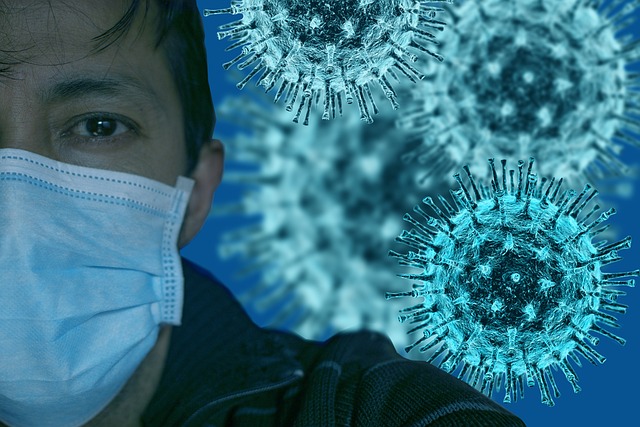Summary Background Better understanding of the long-term health effects after severe acute respiratory syndrome coronavirus 2 (SARS-CoV-2) infection has become one of the healthcare priorities in the current pandemic. We analyzed a large and diverse patient cohort to study health effects related to SARS-CoV-2 infection occurring >1 month post-infection. Methods We analyzed 17,487 patients who were diagnosed with SARS-CoV-2 infection at a total of 122 healthcare facilities in the United States before April 14, 2022. Patients were propensity score matched with patients diagnosed with the common cold, influenza or viral pneumonia from March 1, 2020 to April 1, 2021. For each outcome, SARS-CoV-2 was compared to a generic viral respiratory infection (VRI) by predicting diagnoses in the period between 30 and 365 days post-infection. Both patients with coronavirus disease 2019 (COVID-19) and VRI were propensity score matched with patients without a history of COVID-19 or VRI, and the same methodology was applied. Diagnoses in which COVID-19 infection was a significant positive predictor in both the COVID-19 vs VRI and COVID-19 vs control comparisons were considered COVID-19-specific effects. Results Compared with common VRIs, SARS-CoV-2 was associated with diagnoses of palpitations, hair loss, fatigue, chest pain, dyspnea, joint pain, and obesity in the post-infectious period. Conclusions We identified that some diagnoses commonly described as “long COVID” do not appear significantly more frequent after COVID-19 infection compared to other common VRIs. We also identified sequelae that are specifically associated with prior SARS-CoV-2 infection. |
Comments
MU researchers’ discovery of a list of the top 47 reported symptoms of ’long COVID’ provides a better understanding of how SARS-CoV-2 can mutate or evolve.
In a new study, a team of researchers at the University of Missouri made an unexpected discovery: People who experience long-lasting effects of COVID-19, known as "long COVID" or post-COVID conditions, are susceptible to developing only seven symptoms. health for up to a year after infection. They are: fast heartbeat, hair loss, fatigue, chest pain, shortness of breath, joint pain and obesity .
To develop their findings, the team reviewed real-world Orcale Cerner data from electronic medical records that contained anonymized information for medical research purposes. After examining data from a total of 52,461 patients at 122 healthcare facilities in the United States, researchers selected the 47 most commonly reported health symptoms of long COVID to examine in this study. The researchers then looked for comparisons in reported health symptoms, many also shared by other viral respiratory infections, between people in three different subgroups:
- People diagnosed with COVID-19 but who do not have common viral respiratory infections such as influenza or pneumonia.
- People with common viral respiratory infections but who do not have COVID-19.
- People who do not have COVID-19 or any other common viral respiratory infection.
“Despite an overwhelming number of long COVID symptoms previously reported by other studies, we found only a few symptoms specifically related to an infection with SARS-CoV-2, the virus that causes COVID-19,” said Chi-Ren Shyu, director of the MU Institute for Data Science and Informatics and the corresponding author of the study. “Before looking at the data, I thought we would find a lot of symptoms associated specifically with long COVID, but that wasn’t the case.”
Shyu, who is also the Paul K. and Dianne Shumaker Professor in the Department of Electrical Engineering and Computer Science in the MU College of Engineering, said the results could benefit other researchers’ ongoing efforts to study various impacts of COVID-19.
“Now, researchers will be able to better understand how SARS-CoV-2 can mutate or evolve by creating new connections that we may not have known about before,” Shyu said. “In the future, we can use electronic medical records to quickly detect subgroups of patients who may have these long-term health conditions.”
Adnan Qureshi, professor of neurology at the MU School of Medicine, doctor of neurology at MU Health Care and co-author of the study, said the findings will provide health care providers with much-needed information about what to ask and look for when visiting a patient. who has symptoms of long COVID.
Qureshi said the study results could also benefit researchers examining other aspects of COVID-19, such as the virus’s impact on the brain or the immune system. He said the concept of long COVID was developed after doctors began to notice that a group of people who were called "survivors" of COVID-19 were "no longer necessarily normal."
“Survivors still have symptoms that sometimes disable them and prevent them from returning to work or activities of daily living,” Qureshi said. “This is not because the COVID-19 infection is still active, but rather the infection has caused long-term consequences, or sequelae , in the form of a post-COVID syndrome that could persist for months or even years. “Our research was able to identify long-term sequelae that are distinctive of COVID-19 and separate post-COVID syndrome from other post-viral syndromes.”
“COVID-specific long-term sequelae compared to common viral respiratory infections: an analysis of 17,487 infected adult patients,” was published in the journal Open Forum Infectious Diseases. Other co-authors were Jane Armer and William Baskett at MU, and Daniel Shyu at the University of Minnesota. The study was supported by a grant from the National Institutes of Health (5T32LM012410). The content is solely the responsibility of the authors and does not necessarily represent the official views of the funding agencies.
















